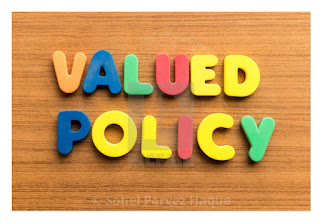Valued Policy
Valued Policy
A valued policy is an insurance policy in which the amount payable for a claim is agreed upon when the policy is issued, and is not related to the actual value of a loss.
With a valued policy, the insurer pays a specified amount of money to or on behalf of the insured upon the occurrence of a defined loss.
For example, homeowners insurance would help someone rebuild a home which was destroyed by a fire. Under a valued policy, a face value is agreed upon, and in the event of total destruction, the insurance company pays out this face value.
An unvalued policy is a policy which does not specify the value of the subject matter insured, but is subject to the limit of the sum insured.
The purpose of the valued policy law is to protect the insured when the subject matter insured is wholly damaged in a covered peril. The law requires that the monetary amount paid to the policyholder should be the monetary amount stated in the policy declaration.
Valued policy laws prevent insurers from collecting a premium to insure a property at its full value, then paying less than that amount after a loss has taken place.
For example, a company might agree to insure a property at a value of 1 million. After an eventuality the insurer realize the property actual cash value is only 800,000 and wish to compensate the insured at the value of 800,000.
#benewinsurance #insurtech #inclusiveinsurance #insurance #reinsurance #takaful




Comments
Post a Comment
Thank you for making this valuable comment.